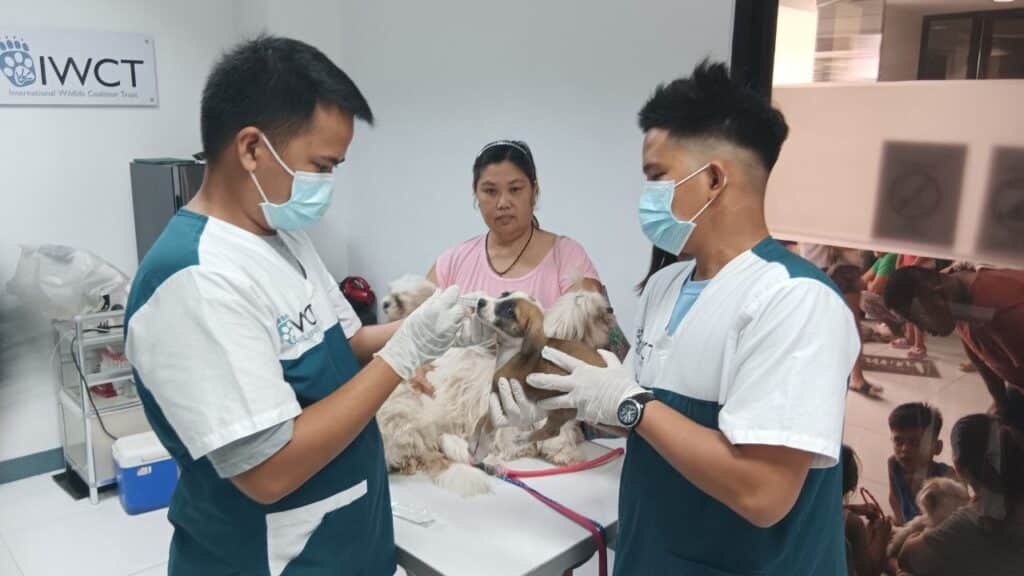Heartworm disease in dogs is a serious and potentially fatal condition that affects dogs worldwide, particularly in areas where mosquitoes are prevalent.
It is caused by the parasitic worm Dirofilaria immitis, which is transmitted through the bite of an infected mosquito. Understanding this disease is crucial for dog owners, as it can have devastating effects on a pet’s health. This blog post will cover what heartworm disease is, the symptoms, how it can be diagnosed, treated, and, most importantly, prevented.
What is Heartworm Disease?
Heartworm disease is caused by long, thin worms that can grow up to a foot long. These worms reside in the heart, lungs, and associated blood vessels of infected animals, causing severe lung disease, heart failure, and damage to other organs in the body. The disease is named after the adult worms that live in the heart and major blood vessels of infected dogs.
When a mosquito bites an infected dog, it picks up microscopic larvae circulating in the dog’s blood. These larvae develop within the mosquito and become infective. When the mosquito bites another dog, it transfers these infective larvae, which then migrate through the dog’s tissue, eventually reaching the heart and lungs where they mature into adult worms.
Symptoms of Heartworm Disease
Common signs of heartworm infection include coughing, exercise intolerance, failure to grow, laboured breathing, a blue or purplish discoloration of the skin and gums, spitting up blood, fainting, nose bleeding, and the accumulation of fluid in the abdominal cavity. The severity of the signs is often related to the amount of lung damage and the dog’s activity level. Active dogs (such as working dogs) will typically show more dramatic signs of infection than will less active dogs. Even though they may have many worms, sedentary dogs may show few or no signs. In addition, clinical signs can be seen as worms die or if blood clots or worm fragments block blood vessels.

Diagnosis of Heartworm Disease
Early diagnosis is key to managing heartworm disease effectively. Veterinarians use several methods to diagnose heartworms:
- Blood Tests: The most common test is an antigen test, which detects specific proteins released by adult female heartworms into the dog’s bloodstream. Another test, called a microfilariae test, looks for the presence of microfilariae in the bloodstream, confirming an active infection.
- Radiographs (X-rays): These can help visualise the heart and lungs and assess the extent of the disease.
- Ultrasound: This can provide a detailed view of the heart and lungs, allowing vets to see the adult worms and evaluate the condition of the heart.
- Complete Blood Count (CBC) and Chemistry Panel: These tests can help assess the overall health of the dog and identify any organ damage caused by the heartworms.
We have been very fortunate at IWCT to have been donated a box of heartworm antigen test kits from Dr Bhea Valle. This will enable us to diagnose the disease in dogs presenting with the above symptoms at our Consultation Clinics. These walk in clinics are held every Tuesday in Concepcion Tarlac at our Treatment Centre where pet owners get free advice, rabies vaccinations and de-wormers for their pet.

Treatment of Heartworm Disease
Treating heartworm disease in dogs is a complex and lengthy process, but it is essential for the recovery of infected dogs. The treatment typically involves several steps:
- Stabilisation: If a dog is showing severe symptoms, they may need to be stabilised with medications and supportive care before starting heartworm treatment.
- Adulticide Therapy: The primary treatment for heartworms is the administration of an adulticide, a drug that kills adult heartworms. The most common drug used is melarsomine. It is usually given in a series of injections over a few months.
- Microfilariae Treatment: After adult worms are killed, the dog will need treatment to eliminate the microfilariae. This often involves the use of specific medications like ivermectin.
- Strict Rest: During and after treatment, it is crucial that dogs have restricted activity. As the heartworms die, they can cause blockages in the blood vessels, which can lead to severe complications if the dog is too active.
- Monitoring: Follow-up tests are necessary to ensure that all heartworms have been eradicated.
Prevention of Heartworm Disease
Prevention is the best approach to protect dogs from heartworm disease. Several effective preventive measures can be taken:
- Monthly Preventive Medications: These are available in various forms, including tablets, topical solutions, and injections. These medications kill the larvae before they can mature into adult worms. Commonly used preventives include ivermectin, milbemycin oxime, and moxidectin.
- Regular Testing: Even if your dog is on preventive medication, it is crucial to have them tested annually for heartworms. This ensures that the preventive measures are working and that any infection is caught early.
- Environmental Control: Reducing your dog’s exposure to mosquitoes can also help prevent heartworm disease. This can include keeping dogs indoors during peak mosquito activity times (dawn and dusk), using mosquito repellents safe for dogs, and ensuring there are no standing water sources around your home where mosquitoes can breed. Do not allow your dog to roam as it can be harder to know whether it has been exposed to mosquitoes.

Conclusion
Heartworm disease is a severe and potentially deadly condition, but it is preventable. By understanding the risks, recognizing the symptoms, and following a veterinarian’s guidance for preventive care, you can protect your dog from this dangerous disease. Regular veterinary visits and adherence to prescribed preventive measures are essential to keeping your dog healthy and heartworm-free.
As passionate advocates for animal welfare, we at IWCT urge all dog owners to stay informed and proactive about heartworm prevention. By doing so, we can ensure our beloved pets live long, healthy, and happy lives.
How You Can Help
We are so grateful to Dr Valle for the donation of the heartworm test kits. However, our wish list of veterinary, surgical and household items is quite vast, any donations in kind are hugely appreciated. You can email the team in the Philippines for a copy of the wish list to see what your company, team, organisation or family can donate to us. Thank you.
Like this blog? Follow us on Facebook for more pet care tips or subscribe to our newsletter.
Help us support more pets in need by making a donation.